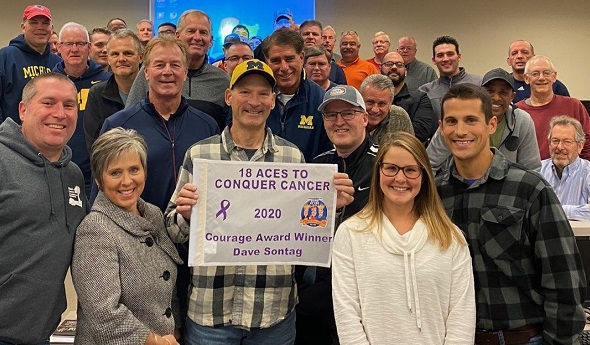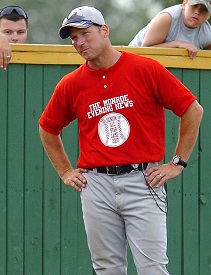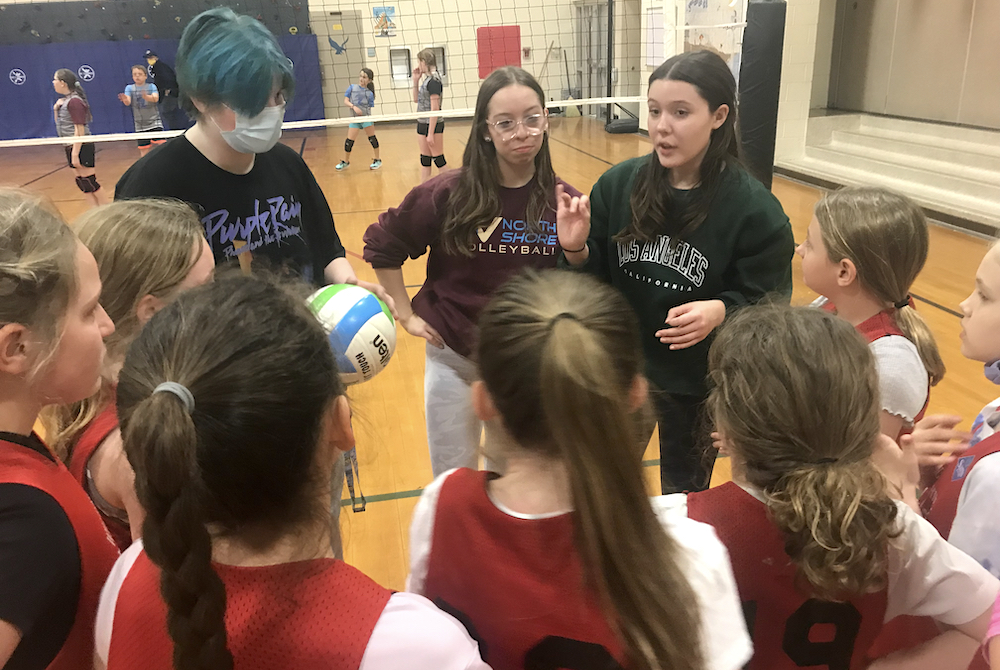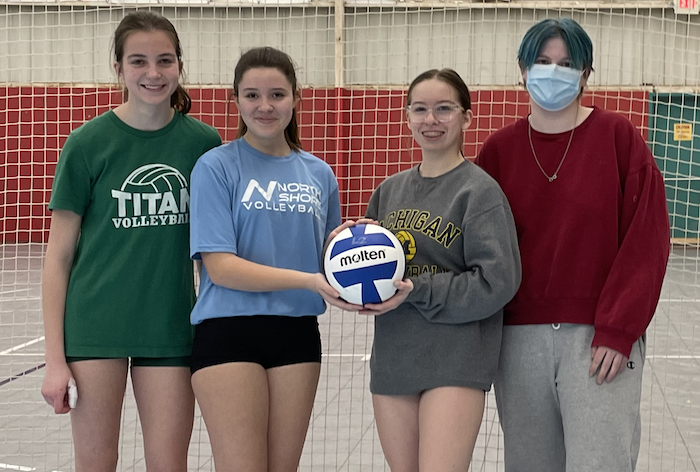
Sontag Inspires Amid 'Miracle' Cancer Fight
January 3, 2020
By Doug Donnelly
Special for Second Half
PINCKNEY – Dave Sontag could tell something was wrong.
 The gymnasium at Petersburg-Summerfield High School is bigger than most in Monroe County. But when Sontag, a veteran official, was running up and down the floor, he felt unusually tired and began feeling pain in his back.
The gymnasium at Petersburg-Summerfield High School is bigger than most in Monroe County. But when Sontag, a veteran official, was running up and down the floor, he felt unusually tired and began feeling pain in his back.
“I knew something was wrong,” Sontag said. “During a timeout, I told one of the other officials who was in the stands watching that he might have to finish the game.”
Sontag, however, pushed through and made it.
“That’s when it all began,” he said.
A few weeks later, as the Saline varsity baseball coach, Sontag was hitting fly balls to the Hornets’ outfielders.
“I was struggling,” he said. “I called the players in and told them something was wrong. I had to stop.”
Still trying to fight through whatever was wrong, Sontag was coaching third base during a Saline intra-squad scrimmage a short time later.
“I started to see white,” he said.
He had another member of the Saline coaching staff call his wife, Michelle, who came and picked him up and took him to the hospital in Chelsea.
“My blood counts were trash, just trash,” he said. “The doctors said I need to have a blood transfusion.”
He was rushed to a Detroit-area hospital for the transfusion. After tests, Sontag was diagnosed with acute lymphoblastic leukemia, an extremely vigorous, aggressive cancer. That was May 15, 2018.
During the 18 months since, Sontag has gone through chemotherapy and radiation treatments. He’s watched multiple communities respond with fundraisers and benefits and amazing support. He’s had more than one bone marrow transplant. He’s heard from countless friends and ex-players who have continued to lift his spirits day after day via e-mails and text messages. He’s been counted out more than once.
Yet, he’s survived.
“Every day has been a challenge,” he said.
***
Sports and Sontag have gone together from the beginning.
He is a Monroe County native who was The Monroe Evening News Player of the Year in baseball in 1978 and went on to play at the University of Toledo. He taught journalism and English at his alma mater, Monroe Jefferson, before becoming a counselor for another 12 years. He was also the Jefferson director of athletics and recreation for a time.
 He coached baseball for the Bears, leading the team to nearly 400 victories and the Division 2 championship in 2002. He stepped down from coaching to follow his kids, who were playing at higher levels; Ryan Sontag played at Arizona State University and in the Chicago Cubs organization. Susan played softball at Bowling Green State University, and Brendan played ball at Indiana Tech University.
He coached baseball for the Bears, leading the team to nearly 400 victories and the Division 2 championship in 2002. He stepped down from coaching to follow his kids, who were playing at higher levels; Ryan Sontag played at Arizona State University and in the Chicago Cubs organization. Susan played softball at Bowling Green State University, and Brendan played ball at Indiana Tech University.
Still, the desire to coach never left their dad.
“After my kids were done playing, I coached freshman baseball at Jefferson,” he said. “I missed it and still wanted to be part of it.”
With his wife a principal in the Saline district, Sontag was asked by Scott Theisen, Saline’s head coach, to join his staff in 2015. He was with the Hornets when they captured the Division 1 championship in 2017, then was named head coach before the 2018 season started.
“That was the year I got sick,” he said. “I didn’t even finish the year.”
Sontag also has been a basketball official for years, getting his start in the early 1980s. He’s been a registered MHSAA high school basketball official for 40 years and has trained officials for the Monroe County Basketball Officials’ Association. He’s called four MHSAA Finals championship games.
“My first varsity game ever was when I was 21,” Sontag said. “I refereed a game at Whiteford.”
***
Sontag previously battled non-Hodgkin’s lymphoma in 1995-1996, beating that disease after a nine-month battle.
Although this cancer battle began as he was new to the Saline community, they embraced his fight, selling “Team Tags” T-shirts and painting the youth baseball diamond with a big ribbon. His son, Ryan, was invited to throw out the first pitch before the youth baseball season started in Dave’s honor.
Back home, in Monroe County, Sontag’s school held similar fundraisers and blood drives.
“I had so much support,” he said. “It was quite amazing to see.”
He tried all sorts of treatments, ultimately boarding an airplane and heading to Seattle for a clinical trial. It didn’t work.
“At that point, I didn’t think I was going to live,” Sontag said. “They told me there was nothing more they could do. They just were giving me something to take the pain away. I was miserable.”
Still, Sontag said, he held out hope.
“I felt it wasn’t time yet,” he said. “I have three grandkids. There are things I want to do. There’s so much I haven’t accomplished yet. In Seattle, they didn’t count on me living.”
But, for a still-unexplained reason, a combination of the medicine he was given to “take the pain away,” on his flight home and a different medicine he received when he returned to Michigan, started to change the way he felt. His blood counts started getting better.
“The side effects were lousy, but, for some reason, it threw me into remission. They checked for leukemia and it was not there.
“We called it a miracle.”
***
Sontag, who lives in Pinckney now, is still dealing with the side effects of nearly two years of treatments. He has a tingling sensation in his arms and legs – the feeling people get when their hands or feet ‘fall asleep’ – and he has a weak immune system.
 But he gets a little better every day.
But he gets a little better every day.
“Every day is a blessing,” he said.
In addition to the community support and constant praying, he credits his wife with guiding him through this process.
“Michelle has been a rock through all of this,” he said. “She’s been by my side every single day. Without her, I don’t know if I would have made it.”
Recently, the Monroe County Officials’ Association held a banquet during which Sontag was presented with a “Courage Award.” He isn’t sure if he’ll be able to referee again anytime soon.
“I told them that night that I’d like to do it again, somewhere,” he said. “I don’t care of it’s a seventh-grade game. I just want to get out there again.”
In addition to the outpouring of love from multiple communities, family and friends, Sontag said sports has kept him alive.
“Sports is part of my fabric,” he said. “Baseball and officiating basketball games has given me that motivation I’ve needed to fight through this. I don’t know if I will coach again or referee again. I’m definitely not going to jump into the same schedule. But there are things I would like to do.
“Will I become a head coach again? Probably not. The task of being a head coach is probably too big right now. But I’d like to be involved. I’d still like to run camps and clinics. I’d still like to officiate too. I want to be a part of it. It’s something that’s in my blood.”
His son Ryan lives in Saline and has three children. Ryan coaches his son in a youth baseball league.
“He called me the other day and asked if I’d help him out,” Dave Sontag said. “I told him I think he will get me out there at some point.”
 Doug Donnelly has served as a sports and news reporter and city editor over 25 years, writing for the Daily Chief-Union in Upper Sandusky, Ohio from 1992-1995, the Monroe Evening News from 1995-2012 and the Adrian Daily Telegram since 2013. He's also written a book on high school basketball in Monroe County and compiles record books for various schools in southeast Michigan. E-mail him at [email protected] with story ideas for Jackson, Washtenaw, Hillsdale, Lenawee and Monroe counties.
Doug Donnelly has served as a sports and news reporter and city editor over 25 years, writing for the Daily Chief-Union in Upper Sandusky, Ohio from 1992-1995, the Monroe Evening News from 1995-2012 and the Adrian Daily Telegram since 2013. He's also written a book on high school basketball in Monroe County and compiles record books for various schools in southeast Michigan. E-mail him at [email protected] with story ideas for Jackson, Washtenaw, Hillsdale, Lenawee and Monroe counties.
PHOTOS: Longtime official and coach Dave Sontag – standing in front row with wife Michelle, daughter-in-law Amy and son Brendan – is presented a “Courage Award” by the Monroe County Officials Association. (Middle) Sontag, formerly baseball coach at Monroe Jefferson and Saline, mans his spot on the baseline. (Below) Sontag with officials, from left, Mike Gaynier, Mike Bitz, Mike Knabusch and Dan Jukuri. (Top and below photos courtesy of Knabusch; middle photo courtesy of the Monroe News.)

Traverse City Athletes Taking LEAP into Coaching, Officiating
By
Tom Spencer
Special for MHSAA.com
March 18, 2022
Set. Spike. Jump – rather maybe leap?
 Nothing new to many female high school student-athletes.
Nothing new to many female high school student-athletes.
But this spring, Abigail Hicks, Keira Castle, Madeline Bildeaux and Honorae Shore made THE LEAP — as in Learning, Enrichment and Athletic Programs (LEAP). They actually leaped into coaching and officiating roles.
Hicks, Castle and Shore stepped into LEAP as coaches for Willow Hill Elementary School’s volleyball team. Bildeaux became a referee for LEAP’s 4th and 5th grade volleyball program.
All four girls are part of the North Shore traveling volleyball club. And, all four are a part of Future Coaches, its 4-year-old program preparing athletes to become effective coaches through LEAP, which is operated through Traverse City Area Public Schools.
Bildeaux and Castle played their first high school volleyball seasons last fall at Traverse City West. Hicks did the same at Traverse City St. Francis. Shore attends Greenspire, a Grand Valley State University-sponsored charter school located in Traverse City.
Parents, grandparents and school administrators love having the high school girls on the sidelines. The girls may love it even more though.
“The most rewarding aspect of teaching young girls is seeing the excitement they get when they get the hang of playing or when they win a game,” noted Castle, who started with the coaching program as an eighth grader. “I also love knowing that I've helped some of these girls fall in love with a sport.”
There may not be anyone more thrilled with the girls taking the leap than David Payne, elementary sports manager for LEAP. The student coaches help LEAP meet its vision of providing preschool through 12th-grade students with increased opportunities for engagement beyond the school day with activities to improve learning, health and wellness.
“The high school girls have a love and knowledge of the game that they share with the elementary kids,” Payne said. “Parents that were not comfortable or able to coach are finding the excitement and interaction between the high school girls and the elementary kids is very positive.
“At times the high school coaches look like cheerleaders on the sidelines,” he continued. “They keep the energy level high while supporting their team.”
The four ninth graders are the latest to make the “leap.” Jordan Bates, founder of the Future Coaches program, first connected the players as coaches with LEAP as COVD-19 shortened the 2020 season. The very first high school volleyball player to make the leap was Phoebe Humphrey, now a Traverse City Central sophomore. Humphrey coached Cherry Knoll as an eighth grader during the 2020 brief season. She is now coaching Eastern Elementary.
The pandemic also resulted in the cancellation of the 2021 elementary season. This season will conclude next week.
“The opportunities for these athletes to coach their own teams is extraordinary,” Bates said. “It would not have happened without David Payne.
 “His support, scheduling acumen, and love of sports has made this program pretty amazing.”
“His support, scheduling acumen, and love of sports has made this program pretty amazing.”
Veronika Caughran, who plays for Traverse City Central, is helping Cherry Knoll Elementary in Traverse City. Anissa Wille, Suttons Bay High School; Jenna Flick, TC West; and TC Central’s Natalie Bourdo and Lily Briggs have coached North Shore travel teams. Briggs, Bourdo and Humphrey have been coaching in North Shore’s beach program for the past three years.
Hicks, who recalls Gladiators varsity players helping coach her in volleyball as a fifth grader, said the girls can’t go it alone. She’s found the Willow Hill school community to be extremely supportive.
“We have received lots of positive feedback from parents, our coaches, our team, and other LEAP coaches,” she said. “All the parents have been very kind and grateful and always willing to support the team by bringing in snacks for after the game — not only for our players but for the opposing team — along with being willing to help line judge and run the scoreboard.”
The high school players-turning-coaches have been attending classes with Bates and guest coaches mostly from the North Shore club. Topics covered include coaching philosophy, how to be a great referee, practice planning, tournament preparation and health and wellness.
Bates said the program benefits go beyond the participants.
“Perhaps the biggest struggle is for athletes and parents to realize how valuable coaching is to an athlete,” he said. “It not only helps them with communication, structure, planning, and strategizing, but also it makes them better athletes earlier in their journey.”
Adding fun too is important, Hicks noted.
“I hope I help make practices a fun environment and for them not to worry about making mistakes and helping them know that not everything is their fault,” she said. “And … how to learn from their mistakes.”
Castle, who started playing volleyball as a fourth grader at Willow Hill, agreed. She recalls fondly the difference past coaches have made in her life, including Bates.
“While I've been coaching I've also noticed how (Willow Hill players) interact with each other and cheer each other on, and it's been such a great experience,” she said.
“I remember the feeling I felt when a coach made me love volleyball, and from coaching these girls I'm starting to see what that's like from a coaching point of view.”
Bates created the program with interscholastic competition and the student-athlete in mind.
“There is also the coaching shortage, so creating opportunities for these athletes to coach, and ref, just made sense,” Bates said.
Castle is preparing to meet the growing needs.
“I plan to continue coaching volleyball until the end of high school,” Castle said. “In a year or two, I want to start coaching middle school volleyball.
“When I get to college I plan to either continue coaching or find a job as a ref.”
Hicks indicated her experience has increased her love for the game of volleyball and respect for coaches.
“I learned that coaching is a little more complex than it looks, and you have to plan practice and be prepared for them to have a bad attitude or unfocused after a long day of school,” she said. “You, as the coach, have to have a good attitude, have lots of patience, be ready to problem solve and get them back on track.”
Teamwork, sportsmanship and the value of hard work are among the strengths Castle and the other future coaches bring to the table.
“We had our girls practice sportsmanship by saying ‘good game’ and waving to the other team,” Castle said. “In practice, we have taught them to work as a team and to always give it your all.”
Hicks recommends coaching to all high school athletes.
“I’ve learned a lot,” she said, “and this has been a positive, fun experience that I definitely recommend.”
 Tom Spencer is a longtime MHSAA-registered basketball and soccer official, and former softball and baseball official, and he also has coached in the northern Lower Peninsula area. He previously has written for the Saginaw News, Bay County Sports Page and Midland Daily News. He can be reached at [email protected] with story ideas for Manistee, Wexford, Missaukee, Roscommon, Ogemaw, Iosco, Alcona, Oscoda, Crawford, Kalkaska, Grand Traverse, Benzie, Leelanau, Antrim, Otsego, Montmorency, Alpena, Presque Isle, Cheboygan, Charlevoix and Emmet counties.
Tom Spencer is a longtime MHSAA-registered basketball and soccer official, and former softball and baseball official, and he also has coached in the northern Lower Peninsula area. He previously has written for the Saginaw News, Bay County Sports Page and Midland Daily News. He can be reached at [email protected] with story ideas for Manistee, Wexford, Missaukee, Roscommon, Ogemaw, Iosco, Alcona, Oscoda, Crawford, Kalkaska, Grand Traverse, Benzie, Leelanau, Antrim, Otsego, Montmorency, Alpena, Presque Isle, Cheboygan, Charlevoix and Emmet counties.
PHOTOS (Top) From left, Honorae Shore, Abigail Hicks and Kiera Castle coach their Willow Hill elementary volleyball team this season. (Middle) Madeline Bildeaux, far left, also has joined Castle, Hicks and Shore as part of the LEAP coaching and officiating program. (Top photo by Tom Spencer, middle photo courtesy of Allie Walters.)

